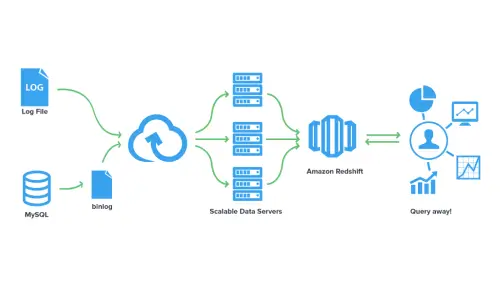Traditional data warehouses require significant time and resource to administer, especially for large datasets. In addition, the financial cost associated with building, maintaining, and growing self-managed, on-premise data warehouses is very high. Amazon Redshift not only significantly lowers the cost of a data warehouse, but also makes it easy to analyze large amounts of data very quickly.
SERVICES OFFERING:
Amazon Redshift offers a fully managed, fault tolerant data warehousing solution that helps you to provision and handle all your data along with your existing BI tools. It delivers fast query performance. The best practice for loading Amazon Redshift is to use the COPY command, which loads data in parallel from Amazon S3, Amazon DynamoDB or an HDFS file system on Amazon EMR.
OUR SKILLS MATRIX:
Amazon Redshift also helps you to automate many of the processes such as provisioning, configuring and monitoring a data warehouse. It is an extremely secure technology solution. Redshift offers the following advantages to business users.
- Extremely fast – Amazon Redshift delivers very high query performance eve on datasets of huge sizes.
- Scalable – Amazon Redshift allows you to easily modify the nodes in your cloud data and scale according to your performance needs.
- Fully managed – Right from managing, to monitoring, scaling and taking backups, Amazon Redshift does it all for you.
- Backups and restores – The snapshot feature keeps backing up new data on the cluster to Amazon S3. They can be stored for a user defined period, right from one to thirty five days. You can also restore your cluster easily.
- Secure – Amazon redshift employs SSL to secure data in motion and AES-256 encryption for data at rest.
- Compliance – Amazon makes it very easy to audit all API calls and is complaint with standard requirements such as SOC1, SOC2, SOC3 and PCI DSS Level 1.
- Compatible with popular tools – Amazon Redshift is compatible with many popular industry standard tools. It is also integrated with other AWS Services.
- Cost effective – You can opt for on-demand pricing which reduces your costs significantly.
OUR TOOLS AND TECHNIQUES:
Amazon Redshift includes complete data warehouse management. It includes setting up, operation and scaling of the data warehouse. The most important feature of Amazon Redshift is that it is highly scalable. It includes the data use from 100 GB up to petabyte or more. This amazing scalability feature makes Amazon web services as the best choice for business of all types.
The launching of a set of nodes is the first thing that has to be done to create a data warehouse. After the launch of the cluster, you can upload the data and perform the data analysis queries. Irrespective of the data size, you will be offered with fast query performance with the SQL-based tools and business intelligence which are commonly used in the current scenario. Appended below are the user benefits of Amazon Redshift.
High support to data warehousing
It facilitates the storage of 100 GB and has the capability to extend up to petabyte or more. In order to reduce the amount of I/O needed to perform queries, Amazon Redshift uses methods such as data compression, columnar storage, and zone maps. On the other hand, the parallel processing data warehouse architecture and parallelizing and distributing SQL operations take maximum advantage of available resources.
No worries on Up-Front Costs
Another advantage is that it helps you to turn off the resources which are not in use. Amazon Redshift services can choose with On-Demand pricing. It is available with no upfront costs or long-term commitments. The Amazon Redshift complete pricing details are available on Amazon Redshift Pricing page.
The Scaling capability
Scalability is the key advantage of Amazon web services. As the performance or capacity needs change, there will be a change in the requirement of the number of nodes. Amazon Redshift facilitates this. Through a simple API call or with a few clicks on the console, the number or types of nodes in cloud warehouse can be changed. Amazon Redshift is highly resizable. During the process of resizing, the existing cluster is placed on the read only mode and the data will be copied from that to the new one in parallel. The queries against the old one can be performed even with the new one being provisioned. Amazon Redshift removes the old cluster when the new one is provisioned.
Simple to operate
Amazon Redshift is very simple to use. Through simple API calls and few clicks in the AWS management console, it is easy to create a cluster with a specified size, node type, and security profile. The tasks such as configuring connections between nodes and the securing cluster can be easily achieved with Amazon Redshift. Through this, the data warehouse will be up and running within a short period of time.
Fully managed service
Amazon web services handle every function related to a data warehouse. It includes managing, monitoring, and scaling of the data warehouse. The function ranges from monitoring cluster health to applying patches for upgrading. Amazon web service’s Redshift takes care of all such activities and helps you to focus on your business.
Regular automated backups
Amazon Redshift facilitates regular automated backups. It is called automated Snapshot feature. It continuously backs up data on the cluster to Amazon S3. It is a continuous, incremental and automatic backing up of data. Amazon Redshift does it for a user defined period such as one to thirty-five days.
Encryption
To secure data in transit, Amazon web services – Amazon Redshift use SSL and for rest, a hardware accelerated AES-256 is used. When encryption is enabled for data at rest, all the data in the disk will be encrypted. Encryption provides you high security.
Some of the world’s biggest and innovative organizations are successful by adopting Amazon Redshift. It has helped in transforming the way their businesses handled the data, and it could transform your business too. It’s time to pull up the socks and begin the migration of data to Amazon Redshift.






